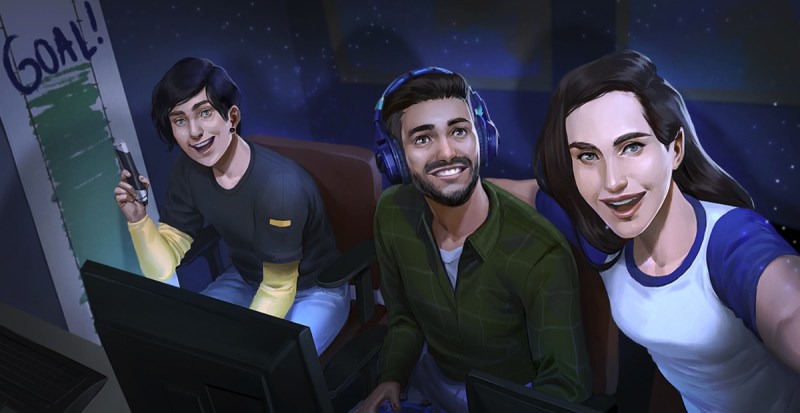GamesBeat: Have you developed any technology on that front in the way that PlayFab or GameSparks did?
Day: We have some of our own tech. We’re always developing tools and stuff internally that enable us to handle assets better, to produce art audio pipelines that are more efficient, and automated testing.
GamesBeat: Is your focus more on the development side than running a game once it’s launched?
Day: Yeah, the live ops stuff — I would love to be more involved in data analytics and predictive analytics. What we do is player support. We have a large team of customer support people that are passionate gamers themselves, that can resolve a lot of issues on first-time contact with players on behalf of our customers. We have chat bots and stuff available to us as well where that makes sense. We can use a bit of AI and tech, but a lot of what we do is people oriented. The technology that we adopt, such as machine translation and so on, that has a role to play, but ultimately, to make a really beautiful, compelling game, I don’t think you can get away from humans.
https://www.youtube.com/watch?v=FSznRs97ZGU
GamesBeat: Would Streamline Studios be another comparison, then?
Day: Yes, I know Streamline. They’re a competitor of ours in a single area. They would compete with us in art creation. We have more than a thousand artists working for most of the large game companies, creating art assets for their games. Some of that we go right into the fully integrated pipeline. We have access to the game engine, and we can do all the animation and art delivery right into the engine. Some is it still more along the lines of, “Can you produce 300 characters?” And then, the client integrates them. But increasingly, we’re becoming more integrated in the production pipeline.
GamesBeat: It seems like there are some specialists out there in the space — like Scalefast. They handle that e-commerce section. And then, there are the other live operations companies. It’s all a form of outsourcing but in bits and pieces.
Day: Yeah, that’s the whole point. It’s all in bits and pieces. You get lots of small companies that are probably good at what they do, but it’s still quite hard for our clients, the big game companies, to partner with these small companies. For us, the ability to do — we have seven service lines — for art, engineering co-development, audio, functional testing, localization testing, translation, customer support.
Being able to do all of that scale to support triple-A games, the world’s leading mobile games — a lot of it is this relentless cadence of games as a service. That becomes really hard for people to do. But we’ve been living with that for a while now in the mobile side of the business.
GamesBeat: I remember that MZ had their real time translation process. They built a real-time infrastructure for mobile games. I wonder how well that could work. Their goal was to have a worldwide game, with people talking to each other in real time across cultural lines.
Day: We work with MZ and do that translation for them and so on. I wouldn’t — it’s daily and weekly.
GamesBeat: It’s not that easy.
Day: No, it’s not something for machines. It depends what you’re doing. You can use machine translation for certain types of content, where it’s not about how enjoyable [it] is so much as just being able to make it understood. If you have a really good machine translation engine, of which there are not many, you can make a lot of content understandable. But actually making it enjoyable is a completely different challenge. I think it’ll be a while before that sort of vision can become a reality, where you can take all content in real time and make it consumable in 20, 30, 40, 50 languages.

Above: Keywords has offices in the U.S. as well for external development.
GamesBeat: With localization you’d hope you could get there are some point. Kate Edwards always talks about the “culturalization” work she has to do, though.
Day: Yes, I know Kate. We live with that every single day. That’s exactly what our guys do. The colors that you choose or the symbols you have on walls in the background, all of that. Our guys are experts at that. That’s part of our role, to try and prevent our clients from making gaffes.
GamesBeat: What kind of specialists do you have in that area?
Day: We have subject matter experts. Depending on what type of game it is, we’ll have people that understand the history of the game, the backdrop to the game, the specific nature of things like tanks or battleships or whatever is part of the game. If it’s a children’s game, we’ll have different people working on that type of content compared to working on a shooter. It’s very adapted to the content itself. You can’t treat all content the same. It’s all very different.
Increasingly now, we’re able to develop — we can do full game development. We can do co-development projects, where somebody like Ubisoft has five of their own internal studios working on Assassin’s Creed Origins and a Keywords studio working on that game as well. We can work alongside them doing one specific aspect of the game.
GamesBeat: I’ve talked to a few iOS developers here about the [difficulty] of developing on both iOS and Android. They’re choosing to go first on iOS and then have someone else handle the Android version because of the fragmentation of the Android hardware.
Day: We do quite a lot of that. It’s not just iOS and Android. It’s also PC to console or console to PC or back catalog stuff that’s going to be remastered for current generations.
GamesBeat: Do you do a lot of work for Switch?
Day: Yeah, we do Switch ports as well. Obviously, there’s a lot of interest in Switch, a lot of Switch porting going on. It’s a very large, very vibrant, very demanding environment out there. I think we’re going to continue to grow. We’re growing very strongly and organically just from repeat business with our clients, getting a bit more share all the time as we prove ourselves.
Acquisitions are also a big part of the Keywords story. We acquired 11 companies last year. The year before that, it was eight, and the year before that, it was another eight. This fragmentation is enormous. Companies like to be part of the Keywords family, where we can relieve some of the financial pressure of running your own business and bring a lot more work to their door. At the same time, our clients like it because we’re able to put some financial footing underneath these companies worldwide, making them more solid and more easy for our clients to trust and partner work in more engaging work.

Above: Keywords.
GamesBeat: How are financial results?
Day: Our revenues for this year are expected to be round about $308 million (250 million euros). I have to be careful here. I think the consensus from the analysts is around $43 million (35 million euros) in profit margin. We’re publicly traded in London. But of course, those numbers are before any acquisitions. Any acquisitions we make this year will affect those.
It’s interesting, when you try to look at Keywords and the trajectory. It’s quite hard to follow. When you’re making as many acquisitions as we make, you have to try to get to the underlying revenues and profits of the business rather than just the publicly quoted figures. At least on a historic basis. Looking forward, the numbers that you see exclude the effect of acquisitions. You have to add however many, six to 10 acquisitions that we might make during the year.
The good thing about it is that everyone who’s sold their business to Keywords has made some money, but they’ve stayed at Keywords, and they’re probably working harder than they’ve ever worked before. It’s not because we’ve got any handcuffs on them. They’re enjoying it. It’s a very exciting place to be.
We’ve gotten to this point from just being one of these small service providers in a single geography. We employed 50 people and had revenues of 3.5 million euros. Now, we have a market capitalization of more than a billion euros. It’s growing fast.

